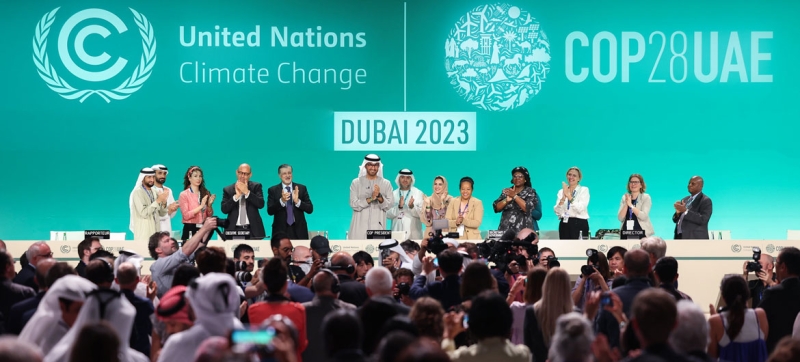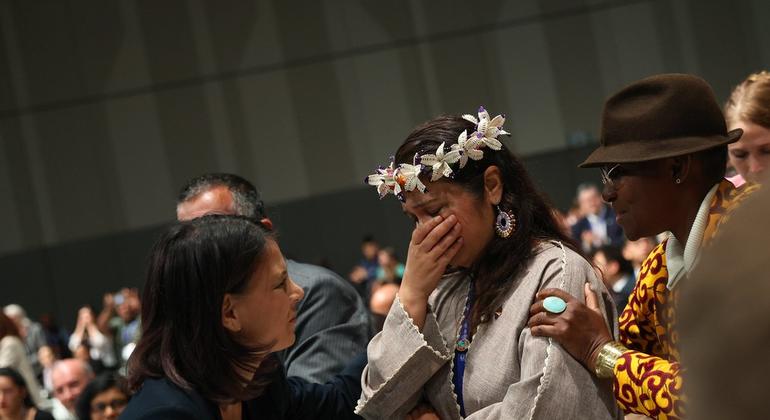
COP 28 participants in Dubai approved a roadmap for the “fossil fuel transition”. COP28: The outcome document includes a call for a “transition” away from fossil fuels for the first time in the history of climate conferences Climate and Environment
For the first time in the history of UN climate conferences, COP 28 in Dubai approved a roadmap for the “fossil fuel transition.” Agreeing on this point was not easy – consultations lasted much longer than planned and ended in a compromise: the final document does not contain a promise to “give up” oil, coal and gas, but at least it mentions fossil fuels.
Commenting on the outcome of the negotiations, UN chief Antonio Guterres noted that mention of fossil fuels, the use of which makes the most significant contribution to climate change, was finally included in the agreement after so many years. Some countries, as Guterres noted, have refused to mention fossil fuels in the outcome document in past years.
He stressed that the era of fossil fuels must end—in a fair and equitable manner.
“To those who spoke against the clear mention of fossil fuel phase-out in the text, my point is that the phase-out is inevitable whether they like it or not. Let’s hope it doesn’t start too late,” added the Secretary-General.
The annual UN climate conference has been held in Dubai, the largest city in the United Arab Emirates, since November 30.
It was due to end on Tuesday, but intensive negotiations over whether the agreement would include a call to “reduce” or “phase out” fossil fuel use have kept COP28 and its members working overtime.
Throughout almost the entire conference, this issue was a stumbling block between activists and countries vulnerable to climate change on the one hand and a number of participating countries on the other.
Hope for cooperation
Science is clear, Guterres says, that limiting global warming to 1.5 degrees “will not be possible without phasing out all fossil species fuel,” and more and more countries are recognizing this. The warming limit was agreed upon at a landmark conference in Paris in 2015.
COP28 negotiators agreed on commitments to triple renewable energy capacity and double energy efficiency by 2030, and made progress on adaptation and financing, including the launch of the Loss and Damage Fund. At the same time, financial obligations are very limited, according to the Secretary General.
The UN chief stressed that much more needs to be done to ensure climate justice for those on the front lines of the crisis.
He said the world cannot afford “delay, indecisiveness or half-measures,” emphasizing that “multilateral cooperation remains the best hope for humanity.”
Lifebuoy
United Nations Framework Convention on Climate Change (UNFCCC) executive secretary Simon Still said “steps forward” had been taken at COP28, but they were “a lifeline, not a finish line.”
In his opinion, the Global Inventory, which is designed to help countries align their national plans with the Paris Agreement, clearly showed that progress is gradually gaining momentum, but is not going fast enough.
Under current conditions, global warming is estimated to be just under three degrees, causing “mass suffering,” so Still said conference participants “needed to do more.”
“In the coming years, we must continue to increase ambition and action to combat climate change,” said the head of the UNFCCC.
Mixed reaction
There was loud applause at the conference’s closing session, but not everyone was happy with the outcome of the negotiations: civil society representatives and activists, as well as delegations from small island developing countries, were not happy with the final agreement.
Samoan representative and chief negotiator of the Alliance of Small Island States Anne Rasmussen noted that the decision was made while her group was still agreeing on a response to the proposed text.
She lamented that they would have to return to their islands with the message that the negotiation process had failed them.
Rasmussen expressed disappointment at the “incremental” rather than “exponential” changes and the lack of “course correction.”
Harjeet Singh, a spokesman for the International Climate Action Network, told UN News Service that while the outcome document’s long-awaited mention of fossil fuels, the resolution was marred by loopholes it contained that could allow the fossil fuel industry to continue to use dangerous technologies.
Singh believes that “rich” countries are paying lip service to the transition to a green economy, while developing countries, still dependent on fossil fuels, are left without reliable guarantees of adequate financial support for a “just transition to renewable energy”.

What else will CS-28 be remembered for??
- Loss and Damage Fund to support those vulnerable to climate change developing countries, was put into effect on the first day of the conference. To date, countries have pledged hundreds of millions of dollars to the fund;
- Countries have committed $3.5 billion to the Green Climate Fund;
- Replenishment of the Least Developed Countries Fund and the Special Climate Change Fund announced in the amount of more than $150 million;
- The World Bank increased climate finance by $9 billion per year (for 2024 and 2025);
- Nearly 120 countries supported the Declaration on Climate and Health to Accelerate action to protect people’s health from growing climate impacts;
- More than 130 countries have signed the Declaration on Agriculture, Food and Climate to support food security and combat climate change;
- 66 countries have endorsed the Global Cooling Commitment, aiming to reduce cooling-related emissions by 68%.
Plans for the Future
Updated National Climate Action Plans – Nationally Determined Contributions (NDCs) – due in 2025 .
Azerbaijan will host COP-29 from November 11 to 22 next year. It received support from Eastern European countries after Armenia withdrew its own bid.
Brazil has proposed holding COP30 in the Amazon rainforest in 2025.
